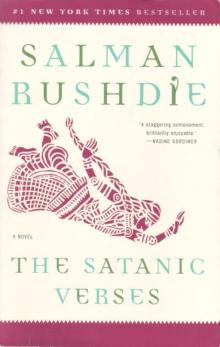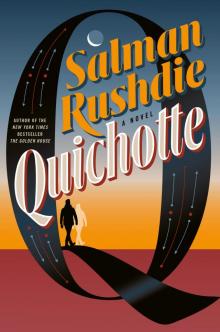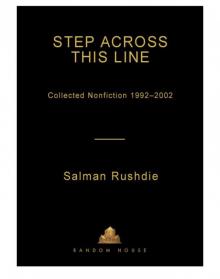- Home
- Salman Rushdie
Quichotte Page 5
Quichotte Read online
Page 5
It occurred to nobody to attach any blame to the prince, who had deserted two women and who, in time, would desert the photographer as well and return to his deeply cushioned and intricately brocaded princely seat to pass the remainder of his days in a happy opium haze. The closest he came to being criticized was when Filmfare magazine ran a photo-story about him titled “Someday My Prince Will Run.” But even in this story the (female) writer took the attitude that boys would be boys, and what man would not follow in the Raj’s wood-leg-real-leg footsteps if he only could? However, Miss Anisa R was devastated by her very public humiliation. In the words of Nargis Kumari, who was happy to gloat publicly over her former friend’s distress, Anisa had “been shown the power of Muslim kismet and of Hindu karma, both of which exact bitter poetic justice upon traitors and wrongdoers.” The words hit their mark. Miss Anisa R gave up her acting career and focused on doing charity work with impoverished widows and deserted women as an act of atonement for the crime of stealing a man from a woman who loved him and for the even more shameful error of being incapable of holding on to her husband. She let herself go physically: That has to be said. She became—there is not a polite way of putting this—blowsy. She sagged; for all her good works, her body became the emblem and manifestation of her grief.
She wasn’t a good mother—too self-absorbed for that—but Miss Salma R grew up perfectly anyway. She was a studious, upright, composed, idealistic, blameless young girl, and as her mother entered her last decline toward second childhood, it was the daughter who played the adult. More than one person reported seeing Salma following her drunk mother around at glitzy fundraising events for her women’s charities, literally taking glasses of Scotch whisky out of Anisa’s hands and pouring the contents into plant pots. “Without the daughter’s care,” people noted, “the mother would never have lasted as long as she did.” Even that daughterly protectiveness proved not to be enough. They had moved into the Juhu mansion after Dina’s death and maybe that was a bad move. Babajan still haunted the house, and now it was Anisa who ignored him as her mother had done before her. Miss Salma R had been fond of her grandfather as a child, and at first she tried to mend fences between her mother and Babajan, but it was too late. The darkness that had swallowed Dina R came for Anisa as well. She saved countless women from the gutter but the lower depths claimed her in the end. Miss Salma R was the one who found her mother in what had formerly been Dina’s bedroom, cold and overdosed with the lights on in the same bed in which her mother had died, similarly illuminated. There was a cockroach crawling up her dangling arm.
Miss Salma R, by this time a nineteen-year-old who had just starred in her first film, did not cry out. She turned and left the room, leaving the lights on, carefully made the phone calls that needed to be made, went to her own room and packed a bag, drove away, and never set foot in that house of death again, leaving to others the task of cataloguing and selling the furniture, the furnishings, the movie memorabilia, and the personal effects—the gowns, the love letters, the photograph albums in which her mother’s life lay embalmed. She wanted none of it, and listened to nobody who told her that she was in the grip of traumatic grief and would regret her decisions later. She turned away from the past with all the steely resolve which would take her to the very top of her profession in two continents. Among the elements of the past which she rejected was her aging grandfather. “He’s a ghost,” she told people. “I won’t let any ghosts haunt me now. He needs to find himself alternative accommodation. The house must be sold at once.”
In one of those extraordinary coincidences that enliven real life but are considered suspect in fiction, she moved into a smart apartment on the very same low hill in Breach Candy where Quichotte had previously been a child, though she was around thirty years younger than her future admirer.
Westfield Estate, as this little group of villas and apartment blocks was known—this microscopic urban speck from which the entire universe was born!—was the creation of an Anglophile developer called Suleman Oomer, also the builder of the somewhat similar Oomer Park properties down the road. He gave many of the buildings majestic-sounding English names: Windsor Villa, Glamis Villa, Sandringham Villa, Bal Moral, Devonshire House, and even Christmas Eve. It was in Christmas Eve, the place where Christmas was eternally promised for the next day but never arrived, that Miss Salma R came to roost. And it was there, three days after her mother’s death, that she agreed to receive an unexpected guest, her mother’s friend-turned-enemy, Nargis Kumari, whose presence allowed Salma finally to grieve for her mother. The veteran actress entered the apartment howling with pain and her voluble sadness overwhelmed the daughter’s grim-faced stoicism. “What a fool I have been,” Nargis Kumari cried, in full tragic actress mode, “to allow a mere man to destroy my closest friendship. What is a man compared to the love between soul sisters? He is a passing shadow. He is a random sneeze. He is a short rain shower on a sunny day. I should have been beside her every minute, sunshine or rain. Now I am as empty as a bottle from which all the wine has been poured. I am a word in a dictionary whose meaning has been erased. I am as hollow as a rotten tree.” Miss Salma R’s tears began to flow. “I will do everything for you,” Nargis Kumari vowed. “You just sit on here and mourn. All requisite duties and disposals will be handled by myself.” A few days later word reached Miss Salma R that Nargis Kumari had been at the Juhu house trying on the dead woman’s most expensive garments and taking many of them away with her, plus matching jewelry. Miss Salma R called her to discuss this. “You didn’t want anything, isn’t it,” Nargis Kumari replied without any shame. “So these few souvenirs of my darling I can keep close to my heart?” Miss Salma R hung up without replying.
After she wept for her dead mother the mood swings began, as if they had been transferred by the magic of grieving from that dead mind to this living one. From that moment onward she found herself on the emotional roller coaster on which her mother and grandmother had spent their lives. There was no escape from dynastic biochemistry. In Miss Salma R’s family the darkness was always there, sitting like a panther in the corner of the room, waiting for its time.
* * *
—
SOME TIME LATER THE AMERICAN TV producer came to call, to tempt her with a California dream. She did not, at first, fall under his spell. “In the industry in this town,” she told the American as they sipped cocktails on her balcony at Christmas Eve, “there are six boys and four girls, and for a picture to be big it must have at least one and one, preferably two and one. The whole annual box office depends on what we choose. So it is a burden, and we must be responsible. The livelihoods of thousands of people are affected by our decisions. This is why it is not easy for me to accept your TV series.” The American had come a long way to do what all the Bollywood ultrastars required: to “narrate” the series idea to them personally. Miss Salma R offered him samosas, gulab jamun, and dirty martinis (up, with olives) and listened with great, wide-eyed seriousness, using the great, wide-eyed, serious look that had served her so well in so many close-ups. This look was as good as the best card player’s poker face. The American could not tell if she was extremely interested, slightly interested, or not at all interested in his pitch. He tried again. “I know you are anxious to expand your range as an actress,” he said. She nodded fervently but her eyes very, very slightly glazed over. “Both creatively and in terms of your reach and penetration.”
Here her mask slipped slightly. Penetration, reach: These were fascinating words. He had her attention now. “I know that your films are huge in the Arab world and the Far East as well as here,” the American said, “and your stage performances command top dollar.” Huge, top, dollar, she thought. These words are so precise, so true. This is a smart man. “Our show will be streamed to every country in the world,” the American said. “You will be the beloved, the obsession, of gauchos on the Argentinian pampa, of cowpokes in Wyoming, of Puerto Rican reggaeton singers, of b
oxing champions in Las Vegas. Teenage boys in colleges will desire you, grandfathers will wish you were their granddaughter in big cities and small country towns from Johannesburg to Vancouver. There will be hundreds of millions of ordinary men, humble men with blue collars, men of low net worth, maybe unemployed men, for whom you will be their greatest treasure, and whose paltry, empty-pocketed lives you will enrich as they binge-watch you in the dark.”
“Girls too,” she murmured.
“Of course girls too,” the American agreed. “To girls everywhere you will be their role model and powerful representative. You will kick ass, if I may say that, on their behalf.”
She wanted to kick ass on their behalf. “So there are some things that worry me, and I should say so now, isn’t it, because when we are on set we should be totally on the same page.”
The American sat up very straight. “Yes, of course,” he said.
“On page thirty, here”—she pointed—“my character is in the bathroom and it seems she is, excuse me, masturbating.”
“That can be fixed,” the American said.
“My character does not masturbate,” said Miss Salma R. “My character kicks ass.”
“Totally,” the American said.
* * *
—
MISS SALMA R CHOSE NEVER to explain the forces that drove her to leave home in her mid-twenties and at the height of her popularity in the Indian cinema (and she was popular, though not as deeply loved as her mother and grandmother), and to seek a new fortune halfway across the world. She loved her hometown and her life in it. And yet she left. There were those who said that her relationship with home had soured after her mother’s death. There were voices that blamed her “unfettered ambition and greed” and even more spiteful voices that called her “a deracinated, self-hating, Westoxicated no-talent” and called for her Indian films to be banned. These voices suggested that if she had a husband he could have knocked some sense into her. The generation of Netflix-and-chill was less judgmental and looked forward to seeing her on their laptops. In their opinion her real migration had been from silver screen to computer screen, not from Bombay/Mumbai to L.A., a migration that made her even more fashionable than before in their eyes. She herself was unclear about her motives. She had begun her meeting with the American determined to refuse his advances, but by the end of it she had accepted his offer. Maybe the unending Hindu-Muslim tension in the city had activated a Muslim-Hindu tension within her own mixed self and she needed to get away from that old quarrel, change that narrative, not be in that story anymore. Maybe it wasn’t about religion. Maybe her spirit was more adventurous than she knew. Maybe there was something in her that wanted to test itself against the challenges of a wider world. Maybe she doubted her own worth and would not be able to think of herself as valuable if she did not pick up this gauntlet. Maybe she really was a gambler at heart and this was her spinning wheel.
There was one character, one story, missing from all the explanations. That was the man whom three generations of women had first loved and then rejected. He never told his story. Neither he nor Miss Salma R ever addressed the question of why he was ejected from the Juhu mansion as soon as Anisa died and never had any more contact with his granddaughter as long as he lived. He gave up his medical practice, went on the pilgrimage to Mecca, and returned to live out his days in silence, an ascetic in a much humbler home than the film star’s residence he had occupied most of his life.
* * *
—
AT FIRST SHE COMMUTED between the two -woods, from Bolly- to Holly-, but as her star rose in the West her trips East became fewer and then stopped altogether. The American showrunner had kept his promise. Her spy drama Five Eyes turned out to be the biggest thing since the last biggest thing, even bigger than that, in fact, and bigger also than the big thing that followed it. Her character’s name was deliberately written to echo her own, deliberately chosen to blur the distinction between the actress and her screen persona. In the show she was Salma C. The C was a private joke, an homage to the initial by which the head of British intelligence was known. The joke was left unexplained because in Five Eyes her character worked for American intelligence and any association with MI6 would have misled the audience, whom the show wanted to perplex and confuse, but not in that way.
Spies were becoming news again. At the end of the Cold War, without the Soviet Union as an enemy, they felt for a time like old hat, and after 9/11 they looked foolish and unprepared. The expansion of the Five Eyes system of cooperation between the English-speaking nations was Western intelligence’s bid to remain relevant, and in Five Eyes “Salma C,” with her expertise in cyber-warfare, rose rapidly through the veiled echelons of the hidden world. In the first season she played the invisible woman, the U.S. chief of counter-terrorism, holding the rank of ambassador. Her work was so secret that her existence could not be publicly confirmed, nor could her name be printed or her movements made public. She wore power suits and trademark aviator shades and spoke Arabic and Farsi as well as the new vocabularies of the cyberworld and had a dreadful relationship with the old white man at the head of the CIA who lusted after her in the most unpleasantly old-fashioned way and simultaneously pooh-poohed her professional concern that cyber-terrorists could be the most significant new foes that America had to face, and when he was murdered in the season finale she stepped over his fallen body and took his job. In the seasons that followed she managed to create a screen persona that was simultaneously patriotic, ruthless, and adorably nerdy, so that half the country fell in love with her and the other half delighted in her scariness.
The intelligence world, inside Five Eyes and outside it, returned to the front pages when it found itself in conflict not only with its usual enemies but with a willful American president as well. In response to real events the series introduced a wholly imaginary chief executive who was obsessed by cable news, who pandered to a white supremacist base, and who had played golf with Salma C’s predecessor and talked locker-room shit to him about girls. This entirely fabulist president was dismayed at Salma C’s accession to the Langley throne. His fictional dislike of immigrants led him to think of his brown, female CIA chief as untrustworthy and probably un-American, and his fictitious inability to focus on complex details meant he was bewildered by her fluency in the new argots of cyberspeak, hacking, and AI, and translated that bewilderment into anger, so that her job was perpetually at risk. In one episode she told the TV president that the new cyber-invasive processes that threatened the Internet’s security procedures, as well as American voting systems, and therefore democracy, could be compared to certain cephalopods like the mimic octopus which could disguise itself so effectively as coral that human beings could not tell the difference. The imaginary president boomed at her in the voice he habitually used to disguise his incomprehension: “Octopuses? I have to talk about octopuses now? We have hostile fucking octopuses infiltrating our systems?”
“Octopi,” said “Salma C,” quietly, and the actor playing the president turned so red that it seemed possible to viewers that he might actually explode. After this episode images of Salma C’s face with a speech bubble saying “Octopi” went viral on the Internet and OCTOPI T-shirts sold very well. Women across and beyond America began saying “octopi” to one another as shorthand for men’s stupidity, and liberals of both genders and all the genders in between used the word to stand for the stupidity of the right. A cartoon of Miss Salma C astride a giant octopus which was crushing the White House in its tentacles became the most popular New Yorker cover image of the year. She was depicted in Time as a multi-limbed Indian goddess with tentacles for arms, the Octopus Woman whose kiss was irresistible even though it killed the men upon whom it was bestowed.
The show ran for five seasons and at the end of it Miss Salma R shed the skin of her alter ego Salma C and emerged as a fully fledged superstar. It was at this moment that she chose, against all ad
vice, to set aside her career as an actor, abandon Los Angeles and the movie industry and move to New York City, and host a daytime talk show on network television, four days a week: a show she would personally own, so that she would never work for anyone else again. It was also at this moment that she revealed her absolute independence and personal power to the people who believed themselves to be responsible for her success, who were convinced that she owed them everything and that therefore they owned her, the men who knew they would never fuck her and therefore sought to possess her in other ways, the agents, managers, lawyers, showrunners, and production executives, the personal publicists, the show publicists, the publicists for the streaming network, as well as the exalted individuals who were never named but were at the foundation of everything, who gnawed like the Nidhogg at the roots of the World-Tree—that is to say, the rich people, the super-rich and the ultra-rich, who owned the people who owned the people who owned the network that owned the show that had made her what she was. Ignoring all these people, she launched her show, and within three years was the most influential woman in America, with the exception, of course, of Oprah, who quickly anointed Miss Salma R as her only possible inheritor, and by doing so kept her firmly in second place.

 Shame
Shame The Enchantress of Florence
The Enchantress of Florence Imaginary Homelands: Essays and Criticism 1981-1991
Imaginary Homelands: Essays and Criticism 1981-1991 Joseph Anton: A Memoir
Joseph Anton: A Memoir Midnight's Children
Midnight's Children East, West: Stories
East, West: Stories Luka and the Fire of Life
Luka and the Fire of Life Fury Fury Fury
Fury Fury Fury Haroun and the Sea of Stories
Haroun and the Sea of Stories Step Across This Line: Collected Nonfiction 1992-2002
Step Across This Line: Collected Nonfiction 1992-2002 The Satanic Verses
The Satanic Verses The Moor's Last Sigh
The Moor's Last Sigh The Prophet's Hair
The Prophet's Hair The Ground Beneath Her Feet
The Ground Beneath Her Feet Two Years Eight Months and Twenty-Eight Nights
Two Years Eight Months and Twenty-Eight Nights Shalimar the Clown
Shalimar the Clown Grimus
Grimus The Duniazát
The Duniazát Fury
Fury Quichotte
Quichotte The Jaguar Smile
The Jaguar Smile Joseph Anton
Joseph Anton Joseph Anton: A Memoir: A Memoir
Joseph Anton: A Memoir: A Memoir Imaginary Homelands
Imaginary Homelands The Satanic Verses: A Novel
The Satanic Verses: A Novel Step Across This Line
Step Across This Line East, West
East, West